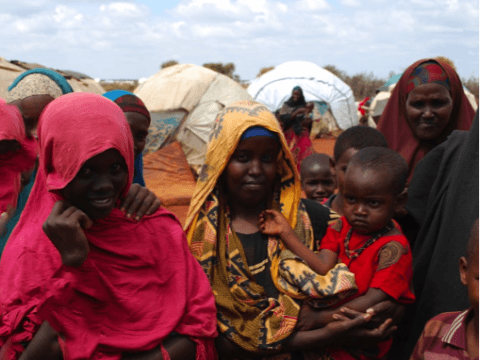From chronic to acute

Iqara, is a mother of three and lives at Reydabkuley IDP camp in Baidoa. She moved from Tiegalow district four months ago. In Tiegalow she was a sharecropper who leased land from a local landowner where she cultivated rain-fed crops.
For the past two-years, Tiegalow has been the frontline area, a conflict zone where Al-Shabab and Ethiopian Defense Forces, have squared off. After two years, Tiegalow Town fell to the Al-Shabab following the withdrawl of the Ethiopian military. Many town people fled to neighboring regions. However, it was not the conflict which led Iqara to flee with her three children and Mother-in-Law, it was the drought. “Fighting was always happening around us, we were in the habit of moving around and starting over, however, the drought was simply too much.”
Since August, she and her family have been trying to scrape by in Baidoa, taking on work as househelp, cleaning better-off families’ homes, mending and washing their clothes. However, this does not provide enough for her family. Several camp members affirmed her plight, reporting that they too were struggling and had reduced to one meal a day.
Technical Specialist, Florence Obura chats with Iqara about health seeking behavior at Reydabkuley IDP. None of her children have received any vaccination, and her younger child Bareline has not received her measles shots. “We are from a far away land, where there is no such things as medical care,” she jokes half heartedly. Iqara is not unique, she is like many Somali mothers who are coming in from long-isolated rural areas, some of which have not seen any kind of health care proivison for six-years.
Poor health seeking behavoir amongst the arrivals, coupled with deplorable hygiene at newly established settlements has been a recipe for disaster. Over the past year, Baidoa has experienced two measles and one cholera outbreaks. Yaqula Ali, another internally dissplaced person at the camp has lost two children in their first month of their life and is now on her ninth pregnancy. In her previous preganacies she has never had the assistance of a mid-wife or been near a medical facility.
Yaqula's story is all too common, with 732 maternal deaths per 100,000 live births, Somalia has among the highest maternal death rates in the world. World Vision Technical Specialist speaks to Yaqula Ali about health service provision in Reydabkuley IDP. Thanks to the funding from the Office of U.S. Foreign Disaster Assistance (OFDA), World Vision and the Ministry of Health SouthWest State are providing health services for mothers like Yaqula and Iqra, who for the first time in their lives, are within a 20-minutes walk from a fully functional Mother Child Health (MCH) facility.
As the drought is accelarating, more people descend upon Baidoa, new IDP settlement sites are forming, and emergency services are being streched to cover new arrivals. Sanitation was also an issue at the camp. There were no latrines and they would go into the bushes to relieve themselves. “We all used to go into the bush to use the toilet and this was not right and if we went out at night, it was dangerous,” recounts Iqra.
Thanks to the funding from the Global Affairs Canada (GAC), World Vision has been addressing some of the pressing hygiene challenges by constructing communal latrines that have also improved life at the site. The construction of a simple, five-stall communal ventilated latrines improves not only hygiene but also creates conditions where dignity can be felt and promotes a sense of security, even in the most precarious of living arrangements.